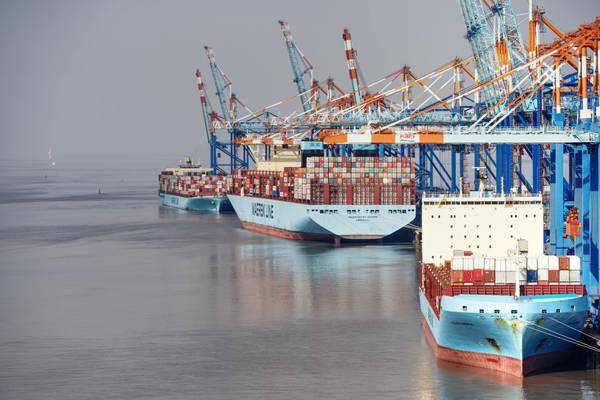
Boost Your Business Success with Cutting-Edge Logistics Solutions in India
In today's rapidly evolving global marketplace, efficient logistics and supply chain management are pivotal for business success. Companies in India, a burgeoning hub for commerce and industry, are increasingly recognizing the significance of robust logistics solutions to maintain competitiveness and operational efficiency. This article explores how businesses can boost their success with cutting-edge Logistics solution company in india, examining the key components, benefits, and the future of logistics in the region.
The Importance of Advanced Logistics Solutions
Logistics is the backbone of any business that deals with physical goods. It involves the planning, implementation, and control of the efficient movement and storage of goods, services, and related information from the point of origin to the point of consumption. Advanced logistics solutions streamline these processes, reduce costs, enhance customer satisfaction, and improve overall operational efficiency.
Key Components of Cutting-Edge Logistics Solutions
-
Technology Integration: Modern logistics heavily relies on technology. Solutions like the Internet of Things (IoT), Artificial Intelligence (AI), and Big Data analytics play crucial roles in real-time tracking, demand forecasting, route optimization, and inventory management. In India, companies are leveraging these technologies to gain a competitive edge.
-
Supply Chain Visibility: Enhanced visibility across the supply chain allows businesses to monitor and manage their logistics processes more effectively. Real-time data on the location and status of goods helps in making informed decisions, reducing delays, and improving customer service.
-
Automation: Automation of warehouse operations, including sorting, packing, and inventory management, reduces human error, increases efficiency, and lowers operational costs. Automated Guided Vehicles (AGVs) and drones are becoming commonplace in advanced logistics setups.
-
Sustainable Practices: As sustainability becomes a priority, logistics solutions are incorporating eco-friendly practices. This includes optimizing routes to reduce fuel consumption, using electric vehicles, and implementing recyclable packaging solutions.
-
Last-Mile Delivery: The last mile is often the most complex and expensive part of the delivery process. Innovative solutions such as delivery drones, electric bikes, and crowd-sourced delivery options are being adopted to ensure faster and more efficient last-mile delivery.
Benefits of Implementing Advanced Logistics Solutions
-
Cost Efficiency: By optimizing routes, improving warehouse management, and reducing waste, businesses can significantly cut down on logistics costs. Predictive analytics helps in anticipating demand and managing inventory more efficiently, thus avoiding overstocking or stockouts.
-
Improved Customer Satisfaction: Timely and accurate deliveries, coupled with real-time tracking, enhance the customer experience. Providing customers with the ability to track their orders and receive accurate delivery timelines builds trust and loyalty.
-
Scalability: Advanced logistics solutions enable businesses to scale their operations more effectively. With automated systems and data-driven decision-making, companies can manage increased volumes without compromising on efficiency or service quality.
-
Competitive Advantage: In a competitive market like India, having a superior logistics system can be a significant differentiator. Businesses that adopt advanced logistics solutions can respond faster to market changes, meet customer demands more efficiently, and operate at lower costs compared to their competitors.
-
Risk Management: Enhanced visibility and predictive analytics help in identifying potential risks in the supply chain, such as delays, disruptions, or quality issues. This allows businesses to mitigate risks proactively, ensuring smoother operations.
The Future of Logistics in India
India's logistics sector is poised for significant growth, driven by technological advancements, infrastructure development, and regulatory reforms. The government’s initiatives like the Goods and Services Tax (GST) and the development of dedicated freight corridors are set to streamline logistics operations further.
Technological Advancements
-
Blockchain Technology: Blockchain can revolutionize logistics by providing a secure and transparent way to record transactions, track goods, and manage contracts. This technology ensures data integrity and reduces fraud, thus enhancing trust in the supply chain.
-
Artificial Intelligence and Machine Learning: AI and ML are transforming logistics by enabling predictive maintenance, demand forecasting, and dynamic route planning. These technologies help in optimizing operations and reducing costs.
-
Autonomous Vehicles: The future of logistics will see an increase in the use of autonomous vehicles, including trucks and drones, for deliveries. This will not only improve efficiency but also reduce the reliance on human labor.
Infrastructure Development
The development of infrastructure is critical for the growth of logistics in India. The government is investing heavily in building roads, ports, and railways to improve connectivity and reduce transportation times. The implementation of the Bharatmala and Sagarmala projects aims to enhance road and port infrastructure, respectively, boosting logistics efficiency.
Regulatory Reforms
Regulatory reforms, such as the introduction of the GST, have simplified the tax structure and reduced transit times by eliminating state border check-posts. Additionally, the implementation of the e-way bill system has further streamlined the movement of goods across the country.
Choosing the Right Logistics Partner
For businesses in India, selecting the right logistics partner is crucial. A reliable logistics provider should offer:
- Comprehensive Services: End-to-end logistics solutions, including warehousing, transportation, and distribution.
- Technological Capabilities: Advanced technology for tracking, inventory management, and data analytics.
- Scalability: Ability to scale operations in line with business growth.
- Sustainability Initiatives: Commitment to sustainable practices and eco-friendly operations.
- Proven Track Record: A history of reliability and efficiency in logistics operations.
Conclusion
In the dynamic and competitive business environment of India, leveraging cutting-edge Logistics solution company in india is essential for success. By integrating advanced technologies, enhancing supply chain visibility, automating processes, and adopting sustainable practices, businesses can achieve significant improvements in efficiency, cost savings, and customer satisfaction. As the logistics sector in India continues to evolve, staying ahead of the curve with innovative solutions will be the key to maintaining a competitive edge and driving business growth.